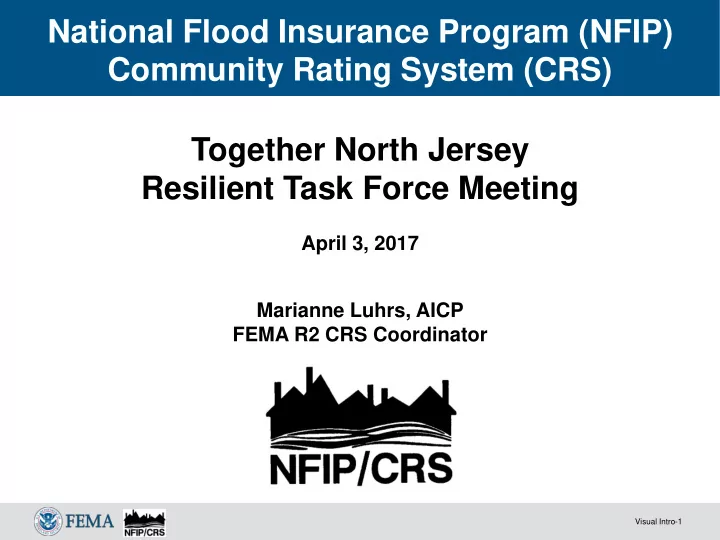

National Flood Insurance Program (NFIP) Community Rating System (CRS) Together North Jersey Resilient Task Force Meeting April 3, 2017 Marianne Luhrs, AICP FEMA R2 CRS Coordinator Visual Intro-1
CRS Program Basics FEMA program NFIP program Voluntary program Provides reduced flood insurance premiums where there is better floodplain management • Above/beyond the minimum NFIP requirements Administered by the Insurance Services Office (ISO) Visual Intro-2
CRS Program Goals 1.Reduce and avoid flood damage to insurable property 2.Strengthen and support the insurance aspects of the NFIP 3.Foster comprehensive floodplain management Visual Intro-3
Community Benefits Money stays in the community Insurance savings offset costs Better and better organized programs T echnical assistance Public information builds constituency Incentive to keep implementing Community pride Visual Intro-4
CRS Community Requirements Be in full compliance with the NFIP Implement activities Maintain Elevation Certificates Verification visit every 3 to 5 years Recertify each year Must meet Class prerequisites • Repetitive loss (Class 9) • BCEGS 5/5 or better (Class 6) • BCEGS 4/4 or better; 1 foot of freeboard and more (Class 4)
CRS Coordinator’s Manual – Series Organization 100 – Program Overview 200 – Procedures 300 – Public Information Activities 400 – Mapping and Regulations 500 – Flood Damage Reduction Activities 600 – Warning and Response 700 – County Growth Adjustment Elements of a comprehensive community floodplain management program
Public Information – 300 Series Elevation Certificates Map Information Service Outreach Projects Hazard Disclosure Flood Protection Information Flood Protection Assistance Flood Insurance Promotion
Mapping & Regulations – 400 Series Floodplain Mapping (Activity 410) • Future conditions • Special flood-related hazards Open Space Preservation (Activity 420) • Including natural functions Higher Regulatory Standards (Activity 430) • Freeboard, building codes, for example • Includes RiskMAP product implementation Flood Data Maintenance Stormwater Management
Flood Damage Reduction – 500 Series Repetitive Loss (RL) requirements (Section 503) • “Category C” requirements Floodplain Management Planning (Activity 510) • 10-step planning process • Credit for HMA Plans • Repetitive loss area analyses • Natural functions plans Acquisition and Relocation Flood Protection Drainage System Maintenance
Warning & Response – 600 Series Flood Warning and Response Levees (Activity 620) • Credit levee maintenance of non- accredited levees (incentive) • Require maintenance of accredited levees before other credit provided Dams (Activity 630) • Coordinate with FEMA Dam Safety
CRSResources.org Visual Intro-17 www.CRSResources.org
NJ Communities and CRS Class 9 - 3 Class 8 - 20 Class 7 - 18 Class 6 - 25 Class 5 - 15 Visual Intro-12
NJ Communities and CRS Visual Intro-13
NJ Communities and CRS Visual Intro-14
CRS NFIP Premium Discounts Class Points SFHA Non-SFHA PRP 1 4,500 45% 10% 0 2 4,000 40% 10% 0 3 3,500 35% 10% 0 4 3,000 30% 10% 0 5 2,500 25% 10% 0 6 2,000 20% 10% 0 7 1,500 15% 5% 0 8 1,000 10% 5% 0 9 500 5% 5% 0 10 < 500 0 0 0 Visual Intro-15
Things to Consider Total # policies in force (PIF) in your community # SFHA policies vs # non-SFHA policies vs #PRPs Total NFIP premium payout- how much money will be saved by community/per household? Do you have any repetitive loss properties? If yes, where are they? Has anything been done to mitigate them? Do you have any minus-rated policies? If yes, why? What is your community already doing that qualifies for CRS? What about NJ requirements? Visual Intro-16
Information You Should Request from FEMA List of Repetitive Loss and Severe Repetitive Loss Properties List of minus-rated properties and submit-to- rate properties NFIP claims? Personally Identifiable Information (PII) restrictions for data release and dissemination
What IF? Sheets
Application Process Application Letter of interest from CEO CRS Quick Check FEMA Region OK’s a visit ISO/CRS Specialist conducts the verification visit Will need a CAV to be done and a letter of compliance from FEMA Region Community can only enter program twice a year (May & October) Visual Intro-19
Upcoming CRS Trainings CRSResources.org – Online Trainings April 18: The Role of the Community CRS Coordinator April 19: Repetitive Loss Properties and the CRS May 16: Introduction to the CRS May 17: CRS and Coastal Hazards June 20: Preparing for a Verification Visit June 21: Developing Outreach Projects (Activity 330) EMI CRS L278 Course: Ocean County OEM - June 26 – 29, 2017 EMI Emmitsburg, MD - September 11 – 14, 2017
Introduction to the CRS Questions? Marianne.Luhrs@fema.dhs.gov Visual Intro-18
Recommend
More recommend